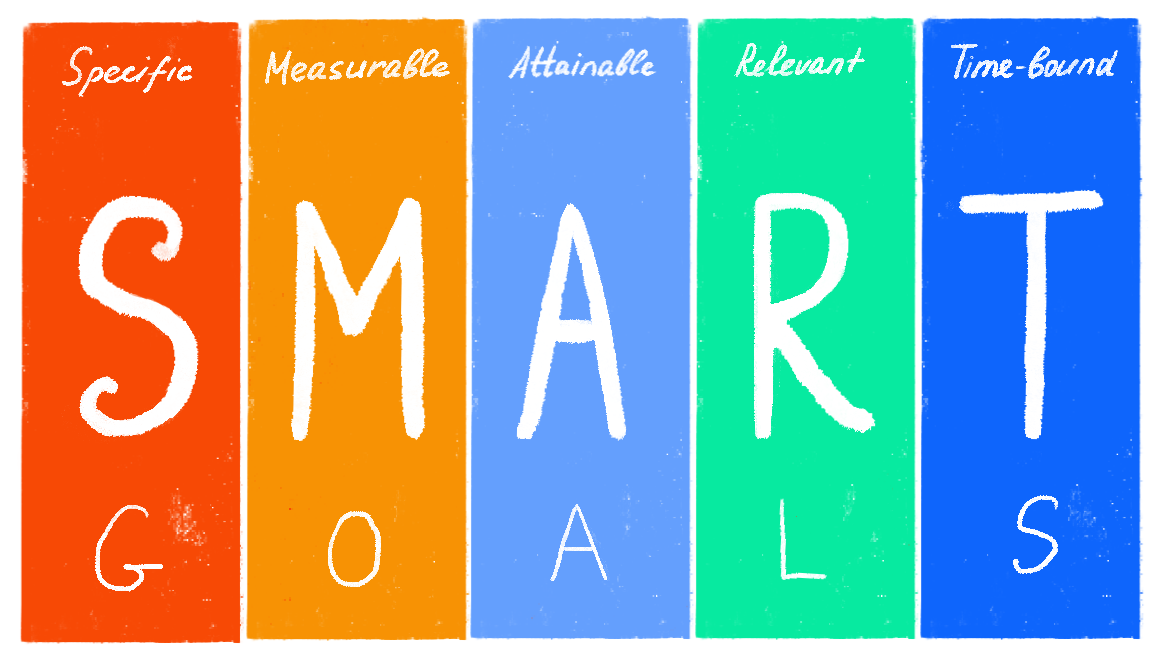Inspiring Career Goal Examples and Tactics
Explore inspiring career goal examples and tactics for achieving success in your professional endeavors. Learn how to set meaningful goals and develop strategies to reach them.

A career goal is a roadmap that defines what you want to achieve in your professional life📍
It's more than just a job title; it's a vision that combines:
- your personal aspirations and personal goals
- specific milestones.
What are Career Goals?
Unlike daily tasks, common career goals are milestones you work towards over time, from a few months to several years.
They act as stepping stones on your path to your dream job.

Short-Term, Mid-Term, and Long-Term Career Goals
Setting Your Sights
Short-term career goals: These are typically actionable objectives that can be accomplished within a year or less. These can include anything from learning a new skill to changing job roles🚀
Mid-term career goals: It is what you aim to achieve in three to five years. These goals may include earning a professional certification, becoming a manager, or switching to a different industry 🌅
Long-term career goals: These are the ultimate objectives you wish to achieve throughout your career. Though they are usually more abstract and difficult to quantify, they can guide your career path. Examples include becoming a CEO, starting your own business, or leaving a lasting impact on your industry🌍
Short, Medium, and Long-Term Career Goals Examples for Professionals
Become a Data Science Leader
- Short-Term🚀 Earn a data science certificate, attend leadership training.
- Long-Term 🌍 Secure a senior data scientist role, mentor junior colleagues.
Content Marketing Expert
- Short-Term🚀 Master SEO best practices, build a strong social media presence.
- Mid-Term🌅 Launch a successful content marketing campaign, secure freelance writing gigs.
Project Management Expert
- Short-Term🚀 Earn a PMP certification, volunteer to lead a small project at work.
- Long-Term 🌍 Secure a project manager position, streamline project management processes.
Cybersecurity Consultant
- Short-Term🚀 Earn industry-recognized cybersecurity certifications.
- Long-Term 🌍 Work for a cybersecurity consulting firm, specialize in a specific security domain.
Work-Life Balance Advocate
- Short-Term: Develop strong time management skills, delegate tasks effectively.
- Long-Term 🌍 Negotiate flexible work arrangements, promote work-life balance within the organization.
Hence, 3 distinct characteristics set top career goals apart from regular goals:
- Impact✅ Career goals target your professional development and fulfillment.
- Investment⏳ They often require sustained effort and learning.
- Adaptability📈 As you learn and grow, your goals may evolve.
How to Set Clear Career Goals


If you plan carefully (or follow a system), there are no surprises.
That's why we suggest Career Ladder In Motion Blueprint (CLIMB).
The CLIMB System
It breaks down the process of setting and achieving career goals into five clear steps.
C - Clarity: Defining Your Ideal Career Path
- How it benefits goal-setting: Imagine trying to climb a mountain without knowing where the peak is – you might waste energy going the wrong way. Clarity is a strategic compass that allows you to develop targeted and relevant goals and guides you to the most impactful actions.
L - Learning: Continuously Developing Your Skills and Knowledge
- How it benefits goal-setting: This step emphasizes the importance of lifelong learning for goal attainment. By actively seeking opportunities to develop your skills and knowledge base, you bridge the gap between your current skill set and the requirements of your desired career goals.
I - Influence: Building Your Network
- How it benefits goal-setting: Here, CLIMB emphasizes the importance of building relationships with people in your desired field as a strategy for goal achievement. Mentors can offer advice and career guidance, while connections can open doors to new opportunities or even job recommendations, all of which directly contribute to reaching your goals.
M - Momentum: Setting SMART Goals and Taking Action
- How it benefits goal-setting: This step focuses on setting goals using the SMART framework: Specific, Measurable, Achievable, Relevant, and Time-bound. SMART goals are clear, actionable, and realistic, which increases the likelihood of achieving them. Taking consistent action keeps you moving forward, and celebrating milestones reinforces positive goal-oriented behavior.
B - Blueprint: Developing Your Career Roadmap
- How it benefits goal-setting: A goal-oriented roadmap is a clear visual that presents the steps you need to take. It includes further education required, specific skills to develop, and relevant work experiences to gain. Focusing on these points prevents you from getting overwhelmed or sidetracked.

The CLIMB system provides a structured approach to propel yourself towards your dream career. It can be applied across industries because it focuses on core career development elements, not industry-specific details.
Examples of Using the CLIMB
Here are 3 scenarios showcasing how CLIMB works in various fields.
Scenario 1: Marketing Professional in Tech
- Clarity: Aspires to become a Marketing Director at a leading tech startup.
- Learning: Takes online courses in digital marketing analytics and social media advertising specific to the tech industry.
- Influence: Networks with other marketing professionals at tech conferences and builds a strong online presence showcasing expertise.
- Momentum: Sets SMART goals such as increasing website traffic by 20% within 6 months and securing a speaking engagement at a relevant industry event.
- Blueprint: Develops a career roadmap outlining the need for additional certifications in tech marketing tools and experience managing performance marketing campaigns.
Scenario 2: HR Specialist to HR Manager
- Clarity: Define the ideal HR Manager role - responsibilities like talent management, employee relations, and HR strategy.
- Learning: Pursue HR certifications like SHRM-CP or PHR to solidify HR fundamentals. Attend conferences on leadership and stay updated on industry trends through publications.
- Influence: Network with HR professionals, and seek mentorship from experienced HR managers.
- Momentum: Set SMART goals - lead an HR project, complete a certification (SHRM-CP within a year), and attend X HR events annually. Track progress and adjust goals.
- Blueprint: Career roadmap outlines gaining experience in different HR areas, developing leadership, and identifying advancement opportunities.
Scenario 3: Graphic Designer in Fashion
- Clarity: Dreams of becoming a Lead Designer for a high-end fashion brand.
- Learning: Enhances portfolio with projects showcasing expertise in fashion-specific trend analysis and garment design software.
- Influence: Participates in online fashion design communities, showcasing work and connecting with industry professionals.
- Momentum: Sets SMART goals like securing freelance projects with smaller fashion labels or winning a design competition within the fashion industry.
- Blueprint: Develops a career roadmap outlining the need for a strong portfolio tailored to high-end fashion brands, potential opportunities to gain experience through internships or freelance work, and skills like trend forecasting specific to the fashion market.
✍️The CLIMB-inspired questions that help you set specific career goals
Clarity
- Who do you admire in your field? What aspects of their career path do you want to emulate?
- What specific challenges are you encountering in your current role? How can your career goals address those challenges?
- What are your salary expectations in 5 years? What skills or certifications do you need to achieve this goal?
Learning
- Based on your desired career path, what is one skill you can build upon in the next 3 months? How will you achieve this (e.g., course, workshop, independent study)?
- Identify a relevant industry publication or online resource. What specific information can you learn from it that will advance your career goals?
- Is there a specific software or tool used in your field that you'd like to master? Create a learning plan to achieve proficiency.
Influence
- Who are three key people you can connect with in your desired field? (Research their backgrounds and prepare talking points for a potential conversation.)
- Can you contribute to an online industry forum or blog? (Sharing your expertise can build your reputation and attract new opportunities.)
Momentum
- What specific skill or knowledge do I want to gain, and by when? (e.g., "What online course on public speaking can I complete by September 1st?")
- What are 3 smaller, achievable steps I can take this week to move toward my long-term career goal? (e.g., "If I want to become a project manager, what 2 networking events or informational interviews can I attend this week?")
- When can I realistically dedicate focused time each week to work on my goals? (e.g., "Can I block out 30 minutes every Tuesday and Thursday morning to work on my online course?")
- How can I measure my progress towards my goals? (e.g., "How many modules of the course will I complete each week to stay on track?")
Blueprint
- What are the first 3 specific steps I can take to reach a long-term career vision?
- What are potential roadblocks?
- What strategies can I develop to overcome roadblocks?
- What is a timeline for achieving my goals?
Bonus Reminder
- Climb one mountain at a time🏔️
What is the "first mountain" (short-term goal) you need to climb to get started on your career journey? How does this fit into your overall CLIMB strategy?

Take Charge of Your Career with TMetric
When considering the objectives we aim to achieve, it's essential to examine activities that consume much of our time and effort yet provide minimal returns or benefits.
Now that you understand how to formulate effective career goals, it's crucial to manage your time effectively to achieve them. TMetric, a time management tool, can help you:
- Track your time spent on work-related tasks.
- Identify areas for improvement in your time management.
- Ensure you dedicate sufficient time to work towards your career goals.
Turn your career aspirations into reality. Start your free trial of TMetric today!


